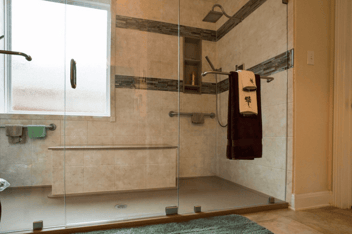2 Min Read
What Type of Flooring is Best For My Bathroom?

Ensuring your bathroom floor is waterproof and fits with your aesthetic are only two of the considerations when thinking about your bathroom renovation. That’s why Legacy Bath and Kitchen has organized this guide to help you make the best flooring decision for your home!
Vinyl Flooring
Wood plastic composite (WPC) or stone plastic composite (SPC) are both 100% waterproof flooring options. Depending on the style of your bathroom remodel, you may like one look better than the other.
Pros of Vinyl Flooring:
- Vinyl flooring is easy to take care of with a regular mopping routine.
- This type of flooring looks great with many designs.
- It is easy enough to install yourself.
Cons of Vinyl Flooring:
- Since wood plastic composite meets such high standards, it can be more of an investment than other flooring options.
- Other vinyl options are less of an investment but they do not add to your home’s resale value.
- Vinyl flooring can be damaged by sharp objects and in those cases are difficult to repair.
Tile Flooring
Bathroom tile, be it porcelain or ceramic, has been a top flooring choice for years. It is readily available, compliments many different designs, and is easy to maintain long term. There are numerous color, size and style choices when it comes to tile flooring. Take your time when deciding if this is the right choice for your bathroom floor installation.
Pros of Tile Flooring:
- Tile floors are notoriously easy to clean since spills sit on top of the tiles.
- They are a durable choice for a high traffic area like a bathroom.
- Tiles can be cut and glazed to fit into any design concept.
Cons of Tile Flooring:
- Given its rigid nature, tile can be uncomfortable to stand on for long periods of time.
- Tile is very cold and can be an unwelcome surprise to bare feet in the winter months.
- It can be a challenge to install it perfectly, so it is recommended that a professional cut and lay your tile floor.
Natural Stone Flooring
Stone floors are a luxurious option for a bathroom floor upgrade. Materials like granite or marble instantly elevate the feel of a space. This is due to the logistics involved in creating these tiles. The stone must be quarried, cut, transported, shaped, polished and shipped. It is no wonder this option remains a popular choice for those with impeccable taste.
Pros of Stone Flooring:
- Natural stone automatically gives your space a luxurious feel.
- Having stone floors makes your bathroom unique, since no two pieces of stone are identical.
- Treated well, stone flooring is very long lasting and durable.
Cons of Stone Flooring:
- This luxury comes at a price, since the materials are finite.
- Stone is extremely heavy, so you may have to reinforce the subfloor before installation.
- Be prepared for regular sealing and resurfacing to make your stone floor last.
Laminate Flooring
At first glance, installing laminate flooring may seem like a terrible idea for a bathroom renovation. Laminate is reputed to absorb water between its joints, causing the floor to swell and buckle. Improvements have been made to the design of these floors, allowing them to become more suitable for high moisture spaces like the bathroom.
Pros of Laminate Flooring:
- Water-resistant laminate options are available and they are easy to install yourself.
- This type of flooring can mimic natural stone or wood to compliment your bathroom renovation.
- It is more comfortable to walk on than tile or stone.
Cons of Laminate Flooring:
- To prevent water from seeping between the seams, you must use a specific type of laminate flooring.
- Laminate cannot be refinished like hardwood; any damaged areas need to be replaced.
- This flooring option can create static electricity.
No matter what vision you have for your home, there is a flooring option that’s right for you. Contact us at Legacy Bath and Kitchen to start your bathroom remodel or floor upgrade today!


